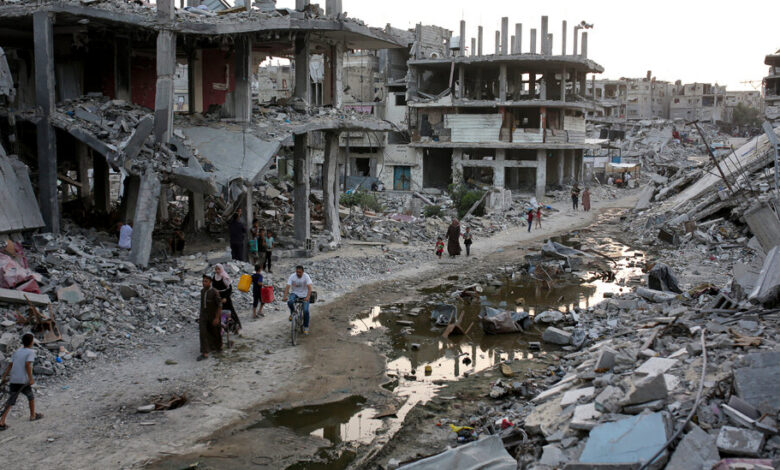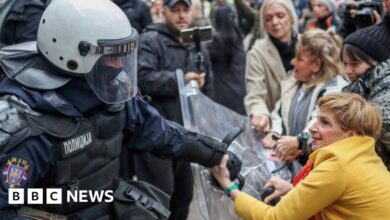Hamas’ ceasefire proposal includes a familiar sticking point

Hamas has softened its latest ceasefire proposal in Gaza but is sticking to a key demand that has been a major stumbling block to a deal, according to two senior officials from countries involved in the talks.
That has dampened the prospects of an imminent deal, even as U.S. and Israeli officials expressed optimism that talks were progressing after weeks of stalemate.
Hamas issued a counter-proposal on Wednesday. Two officials said Hamas wanted international guarantees that, once the initial ceasefire took effect, both sides would continue negotiations until a final agreement was reached to end the war and free all remaining hostages in Gaza.
In fact, Hamas wants to make sure it doesn’t hand over more hostages just to have Israel restart the war, one of the officials said. Both senior officials spoke on condition of anonymity because they were not authorized to speak publicly.
Israeli negotiators immediately rejected that request, two officials said. Israel wanted the option to continue fighting if it deemed necessary. Without such leverage, Hamas could stall, essentially reaching an undeclared permanent cease-fire, one of the officials argued.
At the heart of the dispute is the question of Gaza’s future. Israeli Prime Minister Benjamin Netanyahu has vowed to destroy Hamas and overthrow its rule in the Palestinian enclave. Hamas hopes that a permanent ceasefire will allow it to cling to power.
Current Israeli military leaders more and more say that the deal to repatriate the remaining 120 hostages was the right path, even if it meant Hamas would remain in power for the time being.
The negotiations are based on a three-phase framework first announced by President Biden in late May and later endorsed by the United Nations Security Council.
Both sides agreed on the outlines of a deal that included a six-week ceasefire and the release of most civilian hostages in exchange for Palestinian prisoners.
During the pause, Israel and Hamas will negotiate the next step: ending the war and releasing the remaining hostages, most of whom are soldiers.
The debate now is about what happens next.
Even if Israeli negotiators were able to reach a deal to end the war in Gaza, it remains unclear whether Mr Netanyahu’s government would support it. Two senior members of his coalition have ruled out a full ceasefire, and Mr Netanyahu himself has been publicly evasive about whether he would support such a framework.
According to Israel, about 120 hostages remain in Gaza out of about 250 people kidnapped in the Hamas-led offensive. About a third of them are believed to be dead by Israeli authorities.
During a week-long ceasefire in November, 105 people were released in exchange for 240 Palestinian prisoners, but Hamas has refused to release any more hostages without a path to a permanent ceasefire.
On Friday, an Israeli delegation led by David Barnea, head of the Mossad intelligence agency, arrived in Qatar for the first time in weeks to hold further talks. Barnea met with Qatari Prime Minister Mohammed bin Abdulrahman bin Jassim Al Thani, who has acted as one of the main mediators.
But, in an unusual arrangement, Mr. Barnea did not travel with other senior Israeli security chiefs working to negotiate the deal. He was accompanied by Ophir Falk, a close aide to Mr. Netanyahu, two senior officials said.
The Israeli military and the Shin Bet intelligence agency, both involved in the talks, declined to comment.
Hamas has made a key concession in its counter-proposal, softening its stance on the terms of negotiations for the second phase of the ceasefire. The group wants to keep those talks focused solely on which Palestinian prisoners will be released in exchange for hostages.
The concessions come after weeks of pressure on Hamas from Qatar, where many of the militant group’s political leaders are based in Doha, officials said.
But at the same time, Hamas is asking mediating countries, including the United States, to ensure that talks during the truce will continue until a permanent ceasefire is achieved and all surviving hostages are released, two officials said.
Israeli negotiators have agreed that the six-week ceasefire could be extended as long as talks are ongoing. One senior official said Hamas’ new wording could be interpreted as allowing those talks — and the original ceasefire — to continue indefinitely.
During meetings in Qatar, Mr. Barnea argued that Hamas’s demand would fundamentally violate the proposal that had been endorsed by the United Nations Security Council and Mr. Biden, the senior official said.




